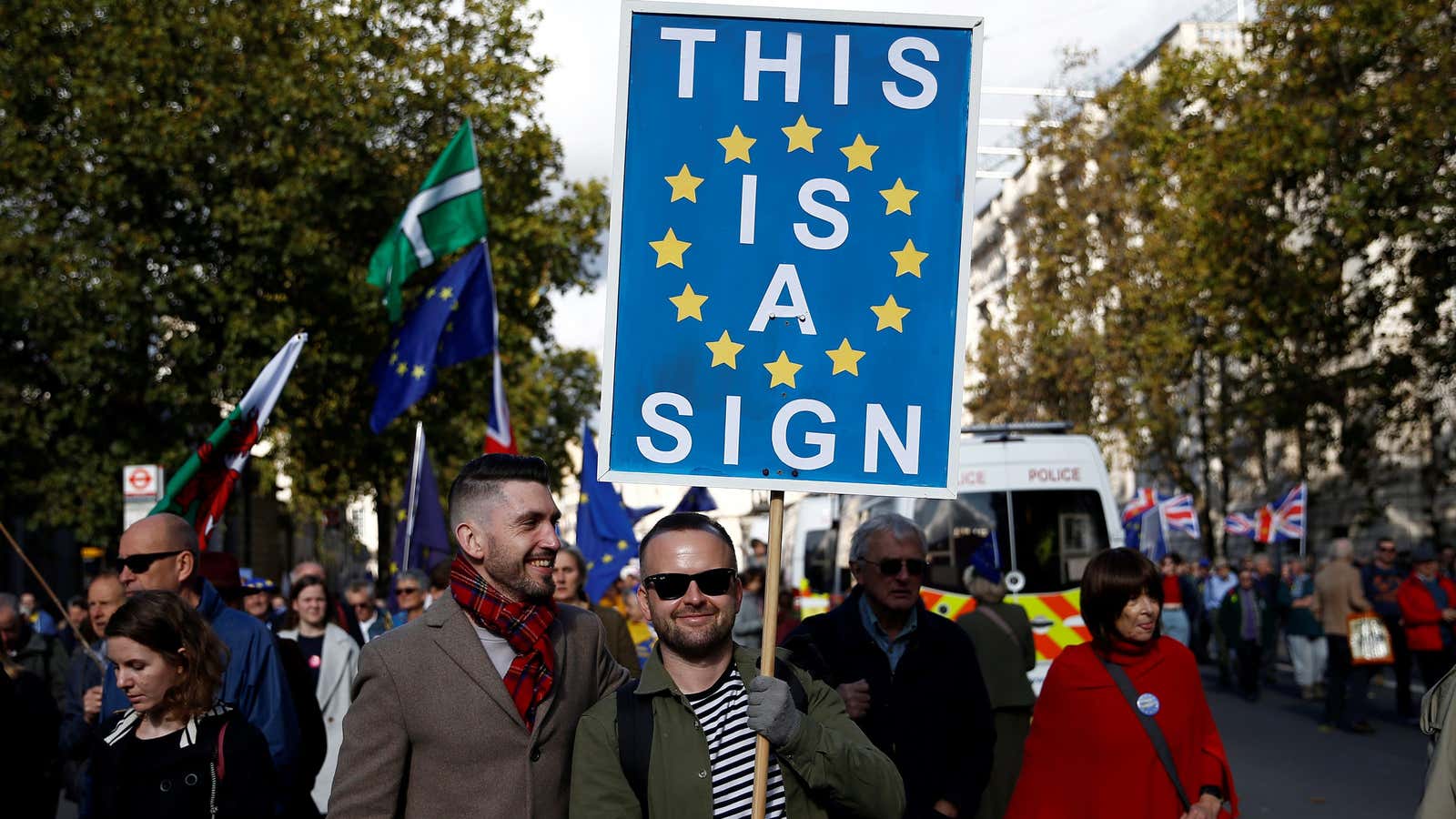Back in 2015, when Greece’s debt crisis made it a possible contender for ejection from the eurozone, talk of a possible “Grexit” was rife. A year later, the day the UK voted in a referendum on EU membership, Quartz published a lighthearted post on the possible names for departures of every member of the bloc. Brexit—a portmanteau of the words “Britain” and “exit”—was among them.
Now, Brexit is so firmly embedded in the English language that the government refers to its Brexit secretary and both its government and EU negotiators somberly discuss the details and date of “Brexit.” Before June 23rd, 2016, it could be argued that “Brexit,” the word, didn’t exist because leaving the EU wasn’t an idea that was truly on the table. But ever since, it sometimes feels as if we’ve talked about little else.
“Hard Brexit” and “soft Brexit” are, similarly, entirely new concepts which began to be discussed in earnest only when Theresa May took over as leader of Britain’s governing Conservative Party, and therefore the country. The 2016 referendum called by May’s predecessor David Cameron had delivered a narrow majority in favour of leaving the EU, and Brexit had become both a word and a plan. Now, it started to acquire definition and texture.
Hard denoted “crashing out”—also a newly-popular phrase—of the European Union without any agreement on what would happen next, even with respect to important matters such as trade and the movement of people. A “soft” Brexit suggested an orderly and well-managed—but less decisive—exit, with agreements in place to smooth the process of disentangling the UK from more than 40 years of membership of the European common market and community. (As prime minister, May herself often answered the question of what would happen with the poker-faced assurance that “Brexit means Brexit.“)
Brexit’s logistical challenges threw up yet another linguistic contortion: The Irish backstop. The biggest problem faced by negotiators has been arrangements for Northern Ireland, which will leave the EU because it is part of Britain, and the Republic of Ireland—the other part of island of Ireland—which will remain. Brexit could mean reinstating a non-porous border between Northern Ireland and the Republic of Ireland, but after years of sectarian conflict in the region, that outcome could be disastrous. That’s where the backstop comes in. Originally a term used to denote a fence or catcher tasked with stopping a ball going out of play, “backstop” was commandeered to signify the various arrangements that may or may not be made to prevent a hard border between Northern Ireland and the Republic of Ireland.
Even the words “leave” and “remain” have taken on new significance. The former became the official word of the campaign for exiting the EU. Remain was chosen to stand for the pro-EU campaign, with some criticising it as a “passion-free” word, compared to the other possible option, “stay.” In his 2018 book, The Language of Brexit Steve Buckledee, a linguistics lecturer at the University of Cagliari in Italy, suggested that Brexit campaigners utilised language more persuasively than their Remain counterparts. Meanwhile, Remainers unhappy with the outcome of the 2016 vote were finding yet another place in the Brexit jargon, with Leave supporters characterizing them as “Remoaners.”
Neologisms continue to sprout. Last week, the EU granted the UK a “flextension” until the end of January 2020, meaning that it would have to leave the bloc by that date, but could do so before as well. The flexible delay to Brexit was an attempt to head off the “ticking clock” problem that has repeatedly seen Britain miss deadlines for leaving the EU. (As Helen Lewis recently pointed out in The Atlantic, Brexit is often used to denote an event; in fact it refers to a process.)
Other terms have also been dusted off for the new age of Brexit. The British government has found itself using “Henry VIII powers,” named for the 16th century English king who acquired the authority to bypass parliament and make law by royal proclamation.
Brexit entered the Oxford English Dictionary in December 2016. The OED’s editors wrote at the time that the addition wasn’t a sign of “Brexit” changing our language forever: That will come in the fullness of time. The UK “is no stranger to political difficulties,” they added, but “the English language can keep up with them, as existing words evolve and new words are formed to describe every twist and turn of the process.”
